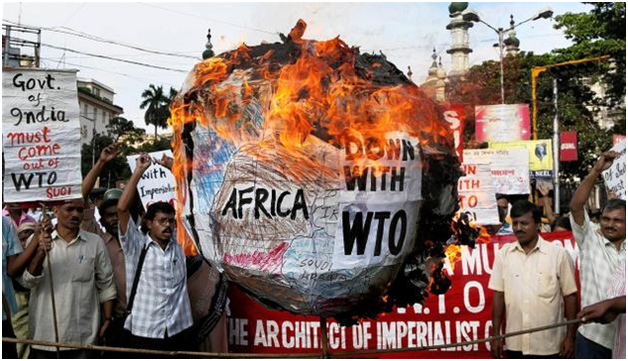WTO: India’s Abject Surrender In Nairobi
In the mid- eighties, Lester Thurow proclaimed" GATT is dead in the water ".
We could say today: " Doha Development Round" is dead in the water".
All ministers have repeatedly declared this in various ways in paras 30, 32, 33 and 34 of the Nairobi Declaration. There is no unanimity on reaffirming Doha mandates, approaches and modalities of addressing the negotiations. (para 30).
There is no unanimity on the Doha structures and architecture.(Para 32).And with these basics in question, the ministers have the temerity to ask their officials to find ways of advancing the negotiations, asking their poor subordinates to do what they would like to do surreptitiously ( like ministers from developed countries) or were too intimidated to do ( like ministers from developing countries) (para 33)!
But this is not as farcical as it sounds: there is no reference to the Trade Negotiating Committee (TNC), the supreme organ brought into being for conducting the Doha negotiations . The only reference is to the General Council and Director General (para 33) who constitute the permanent machinery of the WTO. This is the death- knell of the Doha Round dinned into the deaf ears of all the ministers from the developing countries, who were and are swearing in the name of the Doha Round.
As if this humiliation was not enough, para 34 goes on to say that "some wish to identify and discuss other issues for negotiations ; while others do not." Note the subtle change from " Many " and "others" in para 32 to" some" and "others", almost granting parity of numbers to opposing views!
Such acknowledgement by all ministers in the context of ongoing negotiations constitutes an open invitation to table all contentious new issues such as investment, global value chains, competition policy, labour standards, environment etc (resisted tooth and nail by developing countries all along) in General Council and GC being a subordinate organ to the Ministerial Meeting and not bound by the mandate given to TNC, will be well within its competence to take on board all such issues.
Developing countries will find themselves in no position to stop this. The last line " Any decision to launch negotiations would need to be agreed by all members," is a redundant and ineffectual platitude which does not give any handle to developing countries to nip the process in the bud in GC. What is worse the agreement on the discussion on new issues will be used by developed countries as a bargaining chip to stall any progress in negotiations on all pending issues of the Doha Round!

So, as we shall see presently, we surrender our bargaining chips and arm our adversary with new handle to twist our arm! There goes the dismal failure on the front of new issues.
As regards, the prime concerns viz. Special Safeguard Measures and Public Stock-holding (not to mention the key question of domestic subsidy to agriculture in developed countries), there is no movement whatsoever beyond what was already stated in previous Ministerials and subsequent decisions years ago. The rhetorical repetition of those decisions cannot hide the stagnating status quo. And we came to this pass because(a) we chose to surrender the only bargaining chip in our hand earlier by agreeing to the Trade Facilitation Agreement (in which US was keenly interested) unilaterally without asking for quid- pro- quo in terms of a permanent solution to our public stock-holding programme. (So much for the achievement of flamboyant billateral diplomacy at the topmost level!); and (b) we were too timid to defend our interests at the ministerial meeting using all legal procedures available.
That brings me to the last point. It is no consolation to have another platitudinous homily thrown in: " We acknowledge strong legal structure of this organisation." (para 30). We chose not to use this legal structure. According to WTO agreement(unlike in the erstwhile GATT where there was no alternative to consensus in cases of decisions of a basic nature such as the mandate or scope), if the consensus is not reached, specified majorities are envisaged to reach decisions according to the nature of the decision.
Developing countries chose not to exercise their legal rights. And India chose not to mobilise developing countries for the purpose. Worse still , India did not show the courage that a small country like Nicaragua did in the Paris Climate Conference in raising its flag questioning the arbitrary, stealthy and undemocratic change introduced in the final draft at the last moment (from 'shall' to 'should'). Nicaragua was ignored blatantly by the Chairman of the Conference. But It would have been impossible to ignore India in Nairobi if it had stood courageously to defend its rights and those of developing countries.
If that had happened, either the Nairobi ministerial would have been forced to take decisions by prescribed majorities or it would have collapsed altogether, bringing back the Doha Round to where it was before Nairobi without any encumbrance of new issues.
In the former case, we would have won our point legally . In the latter case, we would been no worse off than where we were before Nairobi.
(S.P.Shukla is former Finance Secretary to the Government of India)
Courtesy: TheCitizen
Disclaimer: The views expressed here are the author's personal views, and do not necessarily represent the views of Newsclick.
Get the latest reports & analysis with people's perspective on Protests, movements & deep analytical videos, discussions of the current affairs in your Telegram app. Subscribe to NewsClick's Telegram channel & get Real-Time updates on stories, as they get published on our website.
























